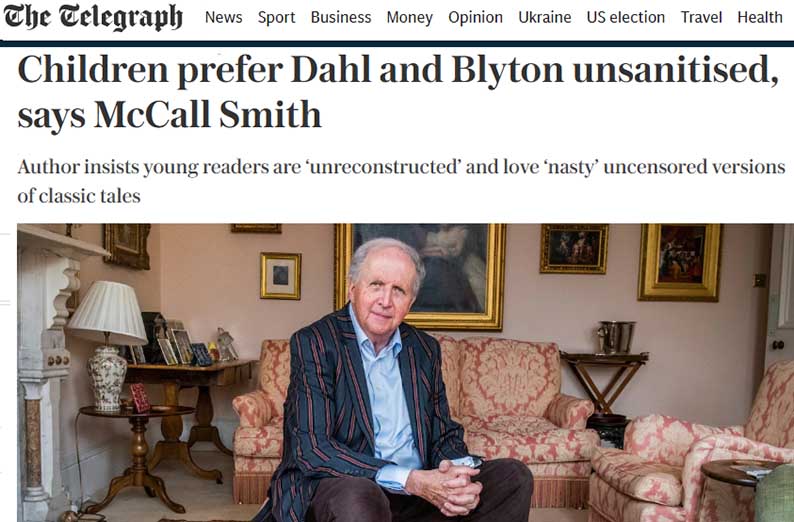
The Telegraph yesterday, August 27:
Sir Alexander McCall Smith has criticised the “censoring” of children’s books by authors such as Roald Dahl and Enid Blyton, arguing that they presented a “sanitised world view”.
McCall Smith, who is best known for his No.1 Ladies’ Detective Agency books, said children are quintessentially unreconstructed” and love the “unbowdlerised” versions of the novels.
While “many enlightened modern parents” would prefer to remove or change parts that offend their sensibilities, he said their offspring “remain doggedly socially conservative, not to say reactionary”.
I don’t know whether McCall Smith – whose Lady Detective novels I enjoyed in my early forties despite finding them doggedly conservative, not to say reactionary – is being fairly quoted by Telegraph Scottish Political Editor, Simon Johnson. But I too deplore the censoring of children’s books on the political correctness grounds implied here.
Which isn’t to say I agree with the proposition that children are conservative if not downright reactionary. I doubt they care either way. It never occurred to me, while devouring Famous Five capers in our crowded council home, that we had neither a tree house in the garden nor a car – far less a cook. (We could have used one, mind. Mum’s cuisine was dire.) Nor did it trouble me that visits from senior police officers, to thank us for stamping out crime while addressing dad as “sir”, were few and far between.
I never compared the circumstances of Julian, Dick, “George” and Anne with my own except to envy the adventures they had with triannual regularity. But I put that down to indifference and blithe ignorance, not social conservatism. In any case I thought we were middle class since that sounded average and I knew families both better and worse off than ours.
(With hindsight I see two things clearly. One is that on Parson Cross, a huge council estate, the children with cupboards stuffed with toys – and correspondingly high status with their peers – had few or no siblings. The other is that at my West Riding school the children most favoured by our teachers were solidly middle class.)
All I cared about was the struggle of Right and Wrong played out, Uncle Quentin excepted, by unambiguous characters in unambiguous weather – if not blazing sunshine then icy whitescape or foggy pea-souper – at the likes of Billycock Hill, Demon’s Rocks and Smugglers Top. (Trivial Pursuits question: which Famous Five yarn does not have a secret passage. Answer: none. How do I know? While reading every last one at least three times to my own children in the eighties I made a point of looking for the exception. I looked in vain.)
Back to my own childhood. These being times of post-war austerity, I and a few million fellow baby boomers feasted on food porn of home made pies and hard boiled eggs, handed over by smiling farmers’ wives along with doorstop slabs of fruit cake to be washed down with lashings of ginger beer. If I didn’t mind the baddies being disproportionately without exception of gypsy or working class origin, it’s not that I was socially conservative if not reactionary. It’s that I never noticed and even if I had the matter would have struck me as perversely off-piste.
Twenty years on I was helping a friend clear his house of the previous owner’s stuff. In the attic we found a Daily Express Campfire Song Book, circa 1930, featuring such gems as:
All through de trees dere am dis mournful sound
All de niggers am so low cas’ down
Cos de pore pore masa in de cold cold ground.
I was 27, a “mature” student on a communication studies degree featuring modules on popular culture that exposed me to Richard Hoggart and Raymond Williams. My joy at so rich a cultural treasure trove turned to horror when this friend, overruling my stern protests, drew a black biro vigorously back and forth to obliterate for eternity each offending word.
Then, belt and braces style, he ripped out that page and others of similar stripe.
Remember the row about Penny Lane a decade or so back? When Liverpool City Council were minded to change its name – conferred in honour of a Victorian philanthropist who’d made his pile in the slave trade – protests came from as far afield as Korea, Cape Town and Connecticut. If memory serves, LCC backed down. Social conservatism had nothing to do with it. You don’t mess with a billion dollar Beatles industry.
For the second time in three posts I’ll quote Caitlin Johnstone:
In just 200 years we’ve progressed from expecting our leaders to slaughter brown-skinned people while saying racist things, to expecting our leaders to slaughter brown-skinned people while condemning racism …
… while also, she might have added, enjoying the fruits of said slaughter even as we use the racism charge as a stick to beat such blue-collar deplorables as Trump and Brexit voters.
I suspect I’m growing more socially conservative but don’t you be calling me reactionary. I just object to revisionism of the whitewashing kind is all.
*
* * *

It was Enid Blyton who made me a reader as she did many of my classmates. That her stories featured upper class kids with white washed existences (in more ways than one) was obvious to us all. I recall the hilarity when one classmate noted that, when the Famous Five went camping, not once in a matter of weeks did anyone have to go for a crap.
In any case, Blyton led on to other things e.g. a now forgotten author called E W Hildick, a school master who wrote about urban kids with far greater insight and imagination than anything Blyton came up with. (Don’t forget that Blyton hated her own kids.) Hildick’s kids really did crap.